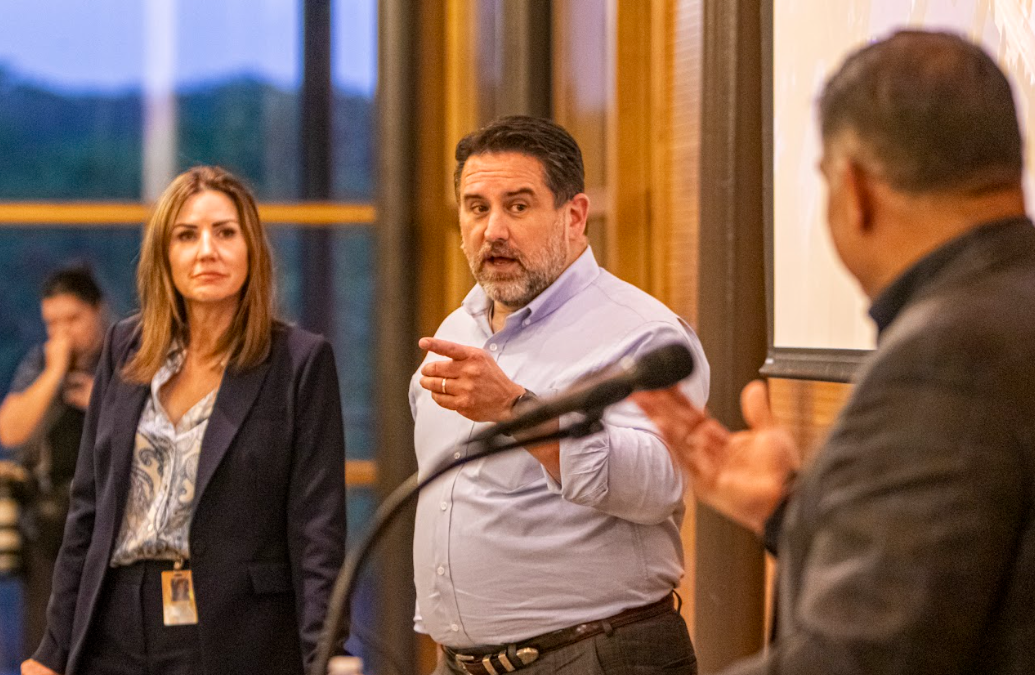The McKinney Humanities Building is adorned with posters from student clubs and organizations depicting the interests and values of UTSA’s diverse student body. This is where Spectrum has made visible the subject of gender-neutral bathrooms at UTSA.
Simple yet bold, the purple poster highlights the anxiety transgender individuals can face when deciding which bathroom to use without drawing attention to themselves. While Spectrum’s “Bathroom Initiative” aims to bring more gender-neutral bathrooms to campus, the organization feels UTSA is already a welcoming environment for inclusiveness.
“For the most part, UTSA is very friendly toward the LGBT community,” said senior and Spectrum president, Marie-Louise Tangu. According to Tangu, UTSA is a comfortable and welcoming space in which the members of her organization — predominantly— students who identify within the spectrum of LGBT or queer identities–feel included and safe.
This sense of security provides promise for UTSA to stand alongside other college campuses that seek to address the needs and concerns of their LGBT students. Progress for transgender individuals is at the forefront of gender conversations; one of the issues is that of gender-neutral bathrooms.
Due to concerns for safety and apprehension to share one’s identity with advisors or other support systems on campus, there is currently no definitive information on how many transgender students make up a college’s student body. In 2007, the Transgender Law and Policy Institute (TLPI) estimated that roughly “two to five percent of the (nationwide university) population is transgender.”
Recently, several states have taken steps towards allowing transgender people to access the bathrooms that correspond with their gender identity. While Texas is not one of those states, the capital city of Austin passed a bathroom ordinance in January requiring businesses to install gender-neutral signs for single stall bathrooms.
Just north of the Austin Boards & Commissions, the University of Texas has been addressing the needs of LGBT students through the Gender and Sexuality Center. The center’s website provides a map and information for finding all-gender/gender-neutral bathrooms on campus, but the school has hit its own snag in funding bathrooms built for the needs of trans students.
According to the Daily Texan, UT policy requires that the construction of any new building on campus must establish one gender-neutral bathroom for every five floors within that structure. The desire is for an improved ratio, but finances have delayed progress at this time.
While UT currently has 32 gender-neutral bathrooms available for students, Tangu claims the number at UTSA is significantly lower.
“We have two unisex bathrooms,” said Tangu. “But they aren’t accessible to everybody.” One bathroom is in the HEB UC; the other is in a campus dormitory. Spectrum and the organization’s advisor, Ann-Margaret Trujillo of the Student Center for Community Engagement and Inclusion, are working with the UTSA Office of Legal Affairs to bring more gender-neutral bathrooms to campus.
What is remarkable about the process, says Tangu, is that hardly any red tape or bureaucratic protocol has complicated their journey toward inclusiveness. While Tangu is optimistic about the momentum of this project, Trujillo feels the need to construct more gender-neutral bathrooms hasn’t been addressed by Legal Affairs. Rather, only a few single-stall bathroom signs have been changed.
“The discussion did not get that far,” said Trujillo. “We only talked about it briefly, and I mentioned that with the student organization’s assistance we might be able to identify some spaces that could be easily converted, which has been done.”
Today, nondiscrimination policies and bathroom laws are presented in the media with both progress and push back. North Carolina recently came under fire with their HB2 law that purports “to provide for single-sex multiple occupancy bathroom and changing facilities” based on biological sex rather than including the notion of gender identity.
When she was running for her current position, San Antonio Mayor Ivy Taylor dismissed the subject of a nondiscrimination ordinance protecting LGBT city employees and contractors, claiming it was “a waste of time” during one of the mayoral debates. She voted against the ordinance when it went before city council.
Last fall, Houston’s rejection of an anti-discrimination ordinance seemed to be what catapulted the issue into the spotlight. When asked whether or not these very public cases have influenced the speed at which Legal Affairs is bringing more gender-neutral bathrooms to UTSA, Tangu smiled and said: “I don’t want to say they were already cool with it, but they’re pretty awesome.”
The nondiscrimination policies at UTSA state that the university will not discriminate based on gender identity and expression. Former UTSA student and professor of English Michael Lee Gardin spearheaded a movement to improve the policy. For Gardin, that meant including gender expression.
“UTSA does not allow its campus members to antagonize someone based on their perceived gendered appearance,” said Gardin. “We would have a campus where we let go of essentializing and stereotypical assumptions about what it means to be a man or a woman and instead start recognizing, affirming and hopefully even respecting a variety of gender identities and expressions.”
Holding on to gender-binary concepts can lead to misunderstanding, tension and hostility toward unconventional change. For Gardin, Tangu and many others at UTSA, this is why it is so important that gender norms and gender itself are discussed and questioned in open and engaging spheres.
With regard to gender-neutral bathrooms on campus, Gardin said, “Folks feeling comfortable and affirmed in their gender identity and expression is crucial. In other words, UTSA campus members should feel safe in their visits to the restroom. Stepping back and hearing that sentence, it is something that seems so basic for everyone – to not face hostility, retaliation or even threats of violence just from existing in a certain space.”
With regard to further bathroom development, Trujillo said, “We will likely continue to discuss this issue in early June with hopes of moving forward after that time.”
The Office of Legal Affairs declined to comment, citing “attorney-client privilege.”
Campus Pride, a nonprofit organization aimed at creating safer and more inclusive LGBT friendly colleges and universities, released their first-ever list of the Top 25 LGBTQ-friendly campuses in 2015. The results are based on “research on policy, program and practice and is conducted for and by LGBTQ experts in the field of higher education.” Factors considered were retention efforts for LGBTQ students and transgender student safety. No Texas college or institution made the list.







